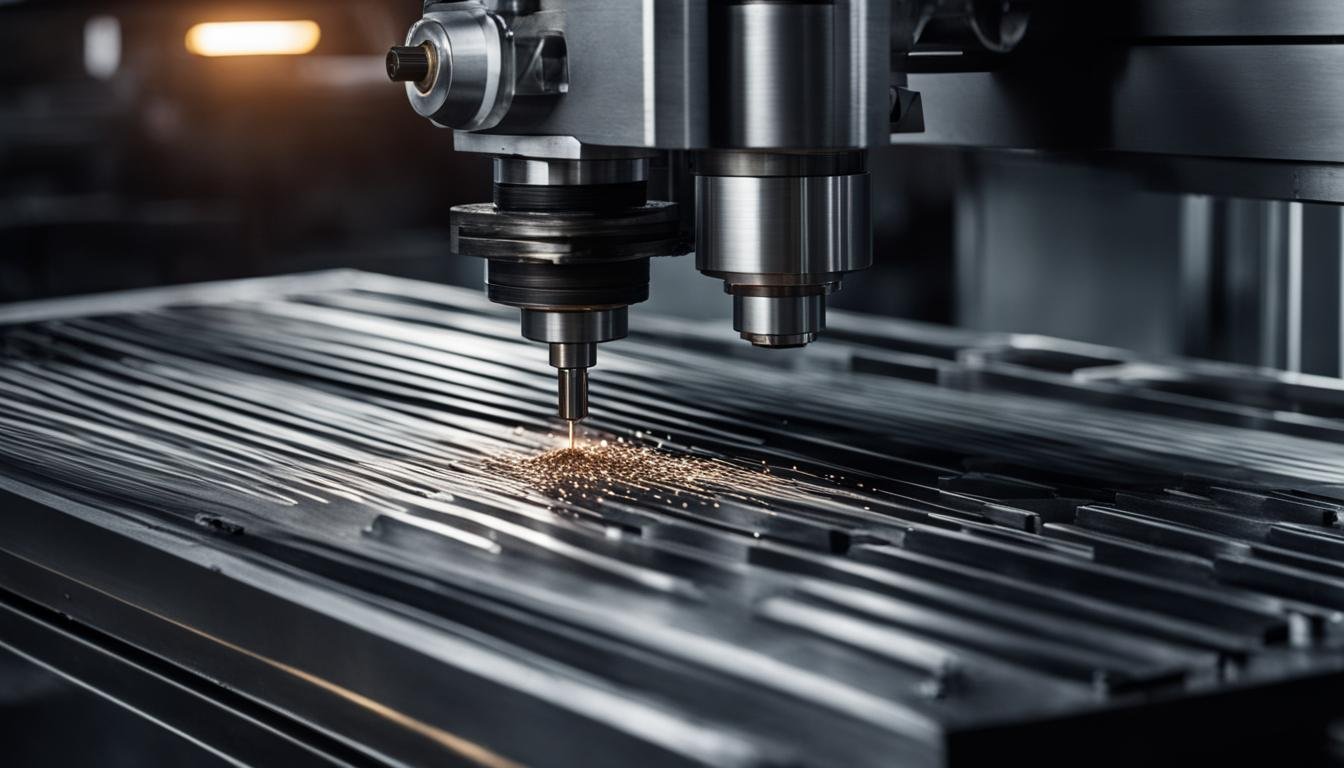Welcome to our comprehensive guide on CNC mill types. In this article, we will take an in-depth look at the different types of CNC mill machines and their applications in various industries. Whether you’re new to CNC machines or an experienced user, this guide will provide you with valuable insights and information to help you better understand the capabilities and advantages of each type of CNC mill.
From milling machines to lathe machines, drilling machines to grinding machines, we will explore the vast world of CNC mill types and their respective functions. This guide aims to equip you with the knowledge needed to make informed decisions when it comes to selecting the right CNC machine for your specific needs and requirements.
Key Takeaways:
- Understanding the applications and capabilities of different CNC mill types is crucial for making informed decisions.
- CNC milling machines offer increased precision and versatility, making them indispensable in various industries.
- CNC mill types include milling machines, lathe machines, drilling machines, grinding machines, and more.
- CNC routers, laser cutting machines, waterjet cutting machines, and electrical discharge machines are also part of the CNC mill ecosystem.
- Consider factors such as workpiece material, desired precision, and budget when selecting a CNC mill type.
Understanding CNC Milling Machines
CNC milling machines have revolutionized the manufacturing industry with their precision and versatility. These machines play a crucial role in various sectors, including automotive, aerospace, and medical fields. CNC milling machines can be tailored to specific applications and materials, making them a valuable asset in any production setting.
One of the key advantages of CNC milling machines is their ability to work with a wide range of materials. Whether it’s hard metals like steel or softer materials like wood, plastic, or soft metals, CNC milling machines can handle them with ease. This flexibility allows manufacturers to create intricate parts and components for different products.
Moreover, CNC milling machines can perform a variety of tasks, making them highly efficient and versatile. They can tap, drill, turn, face mill, and shoulder mill, offering a complete solution for various machining needs. With their advanced technology and automated processes, CNC milling machines ensure consistent and accurate results, improving overall productivity.
Benefits of CNC Milling Machines:
- Precision: CNC milling machines offer exceptional precision, enabling manufacturers to create complex and highly detailed parts with tight tolerances.
- Versatility: These machines can work with a wide range of materials, allowing manufacturers to handle diverse projects without the need for different equipment.
- Automation: CNC milling machines operate with automated processes, reducing the need for manual intervention and increasing efficiency.
- Speed: With high-speed cutting capabilities, CNC milling machines can significantly reduce production time, increasing overall throughput.
- Consistency: The automated nature of CNC milling machines ensures consistent results, eliminating human errors and inconsistencies.
By understanding the capabilities and advantages of CNC milling machines, manufacturers can harness their full potential and optimize their production processes. These machines offer unparalleled precision, versatility, and efficiency, making them indispensable in the modern manufacturing industry.
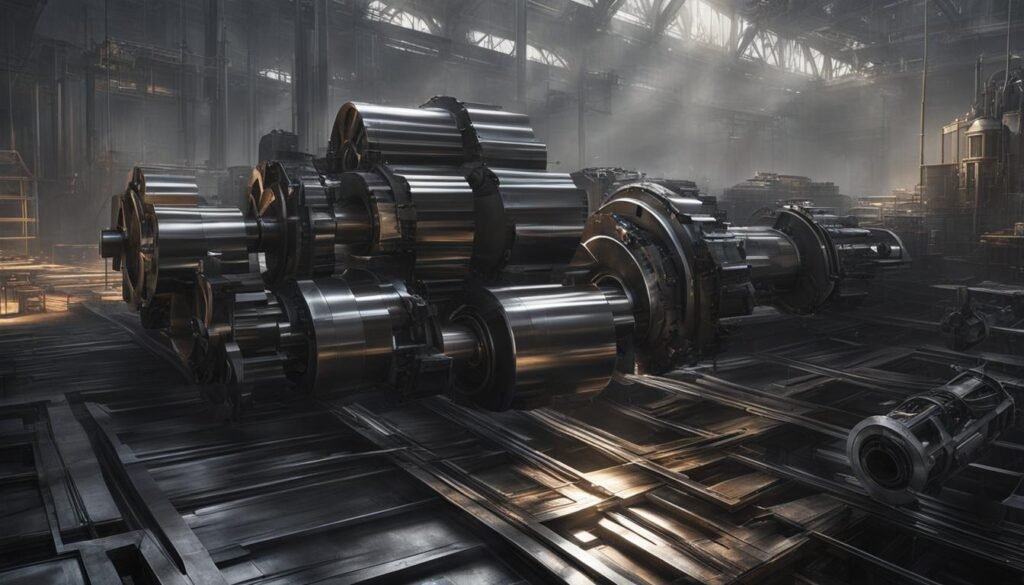
CNC Milling Machines
CNC milling machines are versatile tools that use cutting tools to remove material from a workpiece and shape it to specific specifications. These machines play a crucial role in various industries, such as automotive, aerospace, and manufacturing, due to their precision and flexibility.
The process of using CNC milling machines begins with designing a part on CAD (Computer-Aided Design) software. The design is then converted into a format suitable for the CNC machine to interpret. This allows for precise and accurate replication of the design on the workpiece. CNC milling machines come in various configurations, ranging from basic 2-axis machines to more complex 5-axis or 6-axis systems, offering different levels of flexibility and precision.
One of the key advantages of CNC milling machines is the wide range of cutting tools that can be used. Commonly used tools include end mills, reamers, face mills, taps, and drills. These tools enable the machine to perform various operations, such as drilling, tapping, and milling, offering great versatility in the manufacturing process.
The Advantages of CNC Routers
CNC routers are a type of CNC milling machine that is more suitable for working with softer materials, such as wood, plastic, and composites. They are widely used in industries like woodworking, sign making, and prototyping. CNC routers offer the ability to create intricate designs and shapes with high precision.
The combination of CAD design, cutting tools, and CNC routers provides manufacturing industries with efficient and precise machining capabilities. Whether it’s creating complex parts for the automotive industry or crafting intricate designs in woodworking, CNC milling machines are invaluable tools in modern manufacturing processes.
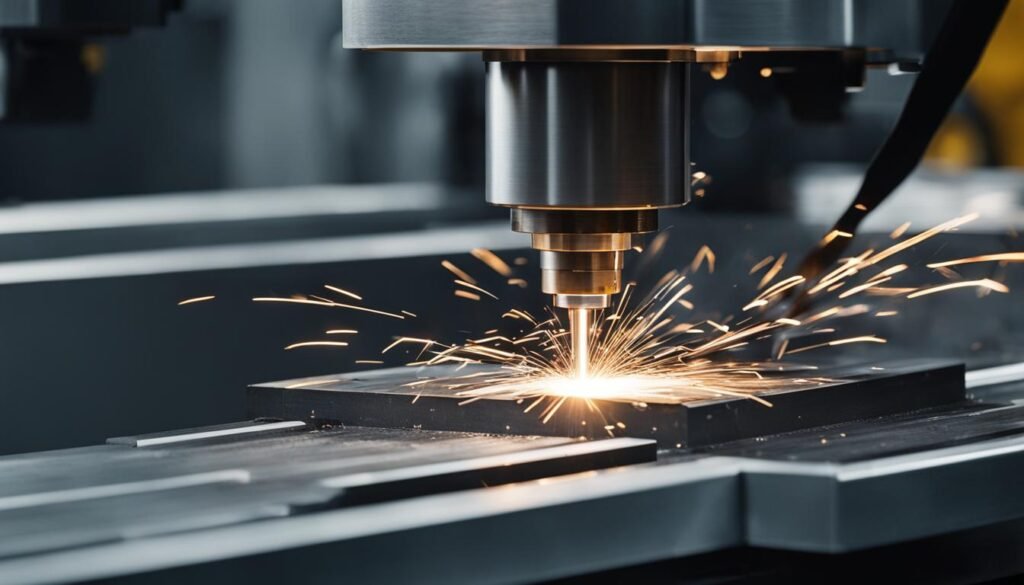
| Type of CNC Milling Machines | Applications |
|---|---|
| 2-axis machines | Ideal for simple milling operations and basic components |
| 3-axis machines | Used for more complex milling operations and multi-sided machining |
| 4-axis machines | Suitable for indexing and rotary milling operations |
| 5-axis machines | Offering the highest level of flexibility and precision for complex parts and contours |
“CNC milling machines are powerful tools that have revolutionized the manufacturing industry. Their ability to accurately shape and machine various materials with high precision makes them indispensable in today’s modern production processes.” – Manufacturing expert
CNC Lathe Machines
CNC lathe machines are an essential tool in the manufacturing industry, enabling precise and efficient shaping of workpieces. These machines are specifically designed for turning operations, where the workpiece rotates while a stationary cutting tool is applied to shape it. The spinning workpiece allows for a wide range of operations, including turning, drilling, and boring.
Turning is the primary function of CNC lathe machines, where the workpiece is rotated against a cutting tool to create cylindrical shapes, conical shapes, or flat surfaces. This process is commonly used for producing shafts, rods, and other rotational components. Drilling operations can also be performed on CNC lathes, allowing for the creation of precise holes in the workpiece.
Boring is another operation that can be achieved with CNC lathe machines. It involves enlarging existing holes or creating internal features, such as grooves or threads, inside the workpiece. CNC lathes are highly versatile and can be used for a variety of materials, including metals, plastics, and wood. They are widely utilized in industries such as automotive, aerospace, and general manufacturing.
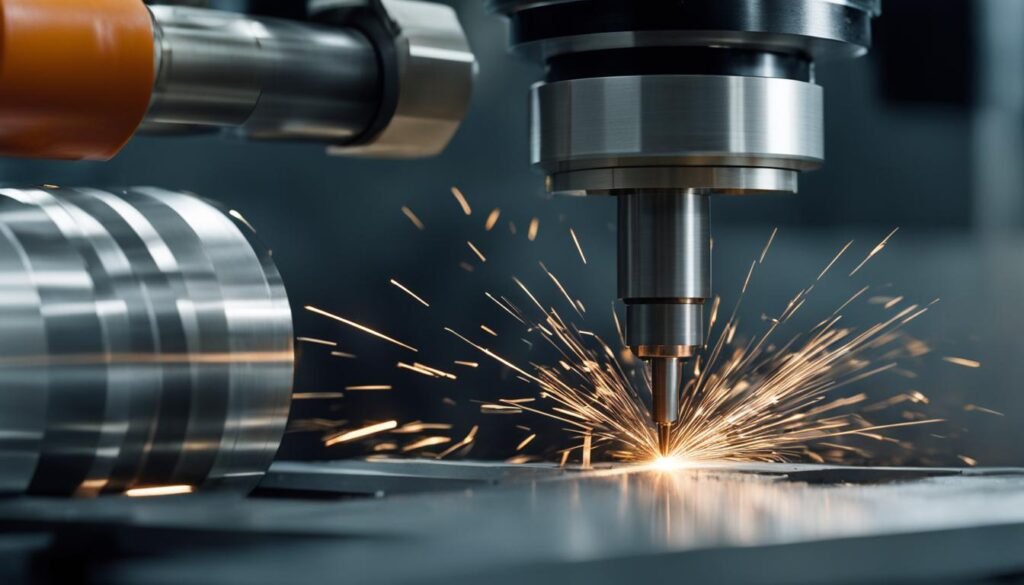
Table: Advantages of CNC Lathe Machines
| Advantages | Description |
|---|---|
| Precision | CNC lathe machines offer high accuracy and repeatability, ensuring consistent results. |
| Efficiency | These machines allow for continuous operation, reducing downtime and increasing productivity. |
| Versatility | CNC lathes can handle various materials and perform a wide range of operations, making them suitable for different industries. |
| Automation | With CNC programming, the operation of a lathe machine can be automated, improving efficiency and reducing the risk of errors. |
With their spinning workpieces and versatile functionality, CNC lathe machines are an invaluable asset in modern manufacturing. They enable precise turning, drilling, and boring operations, delivering high-quality results in a variety of materials. Whether you need to produce cylindrical components or create intricate internal features, CNC lathe machines can meet your manufacturing needs with precision and efficiency.
CNC Drilling Machines
CNC drilling machines are a valuable tool for precise hole fabrication in a variety of materials. Whether you need to create holes for screws, assembly, or visual purposes, these machines offer the convenience of producing specific-sized holes with high-speed drilling capabilities. With their accuracy and efficiency, CNC drilling machines have become a preferred choice in production lines.
However, it’s important to note that CNC drilling machines have certain limitations. They may not be suitable for creating deep or large holes, and specific-sized drill bits are required for optimal results. Despite these limitations, CNC drilling machines still offer significant advantages over manual drilling approaches, particularly in terms of speed and productivity.
When using CNC drilling machines, it’s crucial to ensure the proper selection of drill bits for the desired hole size and material. This will ensure the best performance and prevent damage to the workpiece. Additionally, operators must carefully set the drilling parameters, such as feed rate and spindle speed, to achieve the desired hole quality and precision.
Advantages of CNC Drilling Machines:
- Precise drilling: CNC drilling machines offer high accuracy and repeatability, ensuring consistent hole dimensions.
- Efficient production: With their high-speed drilling capabilities, CNC drilling machines can significantly reduce production time.
- Versatility: These machines can create holes in various materials, including metal, plastic, and wood, making them suitable for a wide range of applications.
- Automation: CNC drilling machines can be programmed to perform multiple drilling operations without manual intervention, improving overall efficiency.
Overall, CNC drilling machines provide a reliable solution for precise hole fabrication with their high-speed drilling capabilities and versatility. By understanding their limitations and optimizing the selection of drill bits and drilling parameters, users can maximize the performance and efficiency of these machines.
| Advantages | Limitations |
|---|---|
| Precise drilling | May not be suitable for deep or large holes |
| Efficient production | Requires specific-sized drill bits |
| Versatility | |
| Automation |
CNC Grinding Machines
CNC grinding machines are widely used in manufacturing industries for their ability to produce superior finishes on cylindrical objects. These machines employ a rotating wheel that grinds metal to create precise and exact shapes. With their advanced technology and precision, CNC grinding machines have become an essential tool for producing complex components and parts.
One of the key advantages of CNC grinding machines is their ability to work on cylindrical objects. Whether it’s creating engine parts or other functional items, such as molds or dies, these machines deliver high-quality finishes. The rotating wheel allows for precise control over the grinding process, ensuring accuracy and consistency.
“CNC grinding machines offer increased precision and the capacity to manufacture complex components.”
– Industry Expert
There are different styles of CNC grinding machines available, including surface grinders, roll grinders, and cylindrical grinders. These machines can be tailored to specific applications, using different abrasives like plated or vitrified CBN, diamond grinding wheels, or aluminum oxide. The choice of abrasive depends on the material being ground and the desired finish.
| Advantages of CNC Grinding Machines | Limitations of CNC Grinding Machines |
|---|---|
|
|

Choosing the Right CNC Grinding Machine
When selecting a CNC grinding machine, it’s important to consider the specific requirements of your application. Factors such as the material to be ground, the desired finish, and the complexity of the component will influence your decision. It’s also essential to evaluate the capabilities and limitations of different CNC grinding machine styles to ensure they align with your needs.
By understanding the capabilities and advantages of CNC grinding machines, you can make an informed choice that will enhance your manufacturing processes and deliver high-quality finishes for your cylindrical objects.
CNC Plasma Cutting Machines
CNC plasma cutting machines are highly effective tools for cutting electrically conductive materials using high-powered plasma. These machines are widely used in various industries, including fabrication shops, automotive repair, construction, and salvage operations.
With their efficient cutting capabilities, CNC plasma cutting machines offer a precise and accurate way to cut metal into precise shapes and sizes. Whether it’s cutting through thick sheets of steel or creating intricate designs, these machines provide versatility and speed in material fabrication.
Artists and designers also utilize CNC plasma cutting machines for creative projects, as they enable the creation of unique and intricate metal artwork. The high-powered plasma torch allows for precise and detailed cuts, making it an ideal tool for artistic expression.
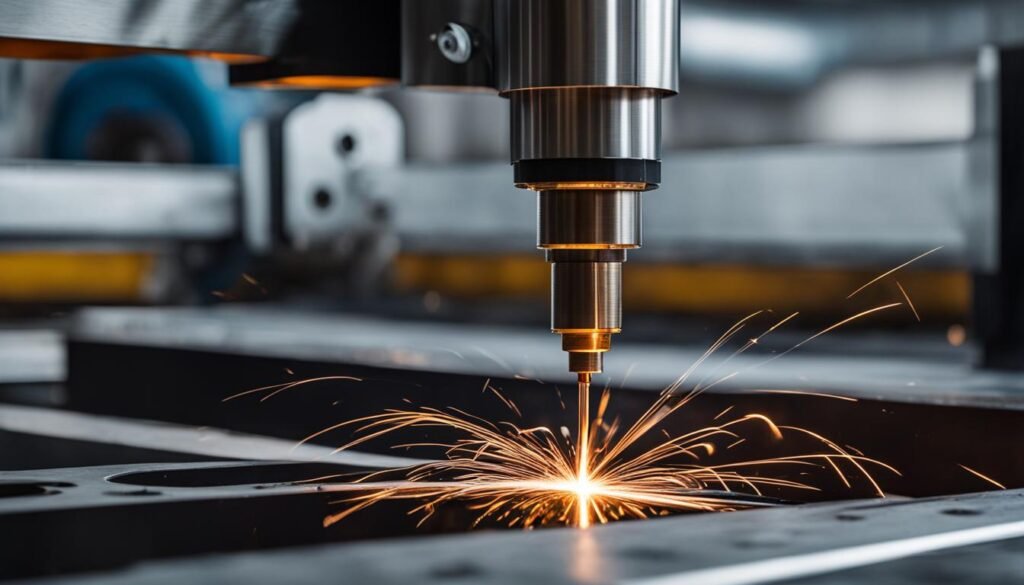
Advantages of CNC Plasma Cutting Machines:
- Efficient cutting of electrically conductive materials
- High-powered plasma torch for precise and accurate cuts
- Versatile application in various industries
- Ability to cut thick sheets of metal
- Fast and efficient production for fabrication shops
Types of Electrically Conductive Materials:
| Material | Examples |
|---|---|
| Steel | Carbon steel, stainless steel |
| Aluminum | Aluminum alloy |
| Copper | Copper sheet, copper pipe |
As technology advances, CNC plasma cutting machines continue to improve in terms of precision and cutting abilities. The cost of an entry-level CNC plasma cutting machine can start at approximately $5,000, making it an affordable option for small businesses and hobbyists alike.
CNC Laser Cutting Machines
If you are looking for precision cutting with versatile applications, CNC laser cutting machines are the perfect choice. With their focused lasers, these machines can effortlessly cut through various materials with utmost accuracy.
Whether you need to cut plastic, paper, fabric, metals, or hardwood, CNC laser cutting machines offer unmatched precision and clean cuts. The highly focused lasers ensure that the material is cut exactly as per your specifications, resulting in flawless finished products.
From engineering purposes to cutting structural and piping materials, CNC laser cutting machines can handle a wide range of applications. Their versatility makes them ideal for intricate designs and complex shapes, making them a popular choice in the manufacturing industry.
“CNC laser cutting machines are a game-changer when it comes to precision cutting. They allow us to achieve intricate designs and produce high-quality finished products with ease.” – CNC manufacturing expert
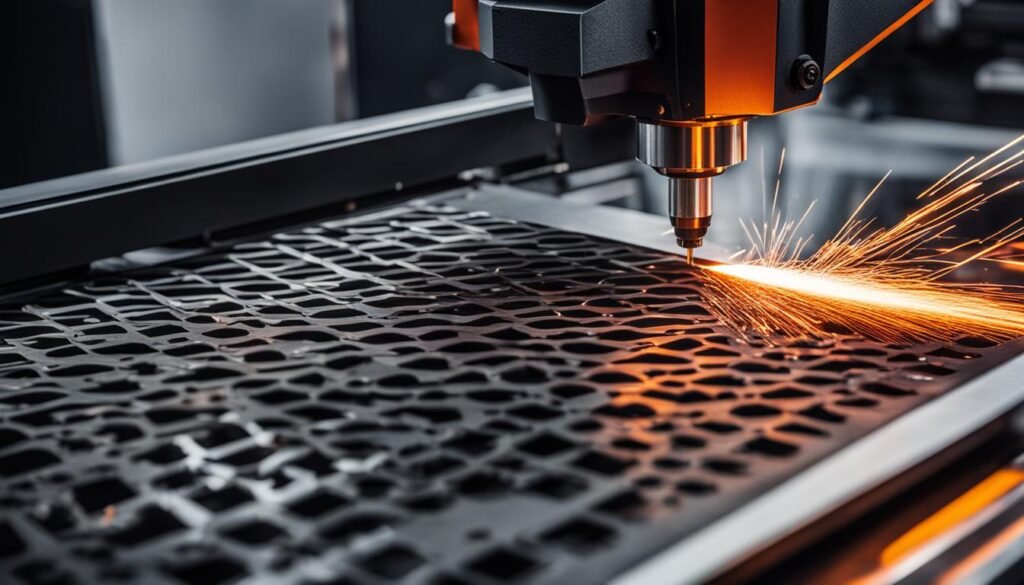
| Advantages of CNC Laser Cutting Machines | Applications |
|---|---|
|
|
When considering CNC laser cutting machines for your business, it’s important to note that the cost can vary depending on the model and features. Entry-level machines can start at around $5,000, while more advanced models can range up to $300,000.
With their precision cutting and versatile applications, CNC laser cutting machines are a valuable asset for any industry that requires intricate and flawless designs. Invest in these machines to take your manufacturing capabilities to the next level.
CNC Waterjet Cutting Machines
In the world of CNC milling, waterjet cutting machines offer a versatile solution for cutting a wide range of materials. These machines utilize high-pressure water jets to precisely cut through various substances, making them ideal for heat-sensitive materials that could melt at high temperatures. The use of waterjet technology allows for clean and accurate cuts, making it a preferred choice in industries such as glassworking and manufacturing decorative pieces like kitchen splashbacks and stained glass.
The high-pressure water jets generated by CNC waterjet cutting machines provide a precise and efficient method for cutting different materials. Whether it’s plastic or aluminum, these machines can handle a variety of materials with ease. Unlike other cutting methods, waterjet cutting does not produce heat-affected zones or alter the properties of the material being cut, ensuring a high-quality finished product.
Although CNC waterjet cutting machines may be slower compared to CNC plasma cutters or CNC laser cutters, they offer the advantage of versatility. The ability to cut intricate shapes and work with heat-sensitive materials sets them apart from other cutting machines. However, it’s essential to consider the specific requirements of your project before choosing a CNC waterjet cutting machine, as they may not be suitable for every application.
“CNC waterjet cutting machines provide a precise and efficient method for cutting a wide range of materials, making them ideal for heat-sensitive substances that could melt at high temperatures.”
Advantages of CNC Waterjet Cutting Machines:
- High-pressure water jets allow for precise and clean cuts
- Versatility in cutting a wide range of materials
- Ability to cut intricate shapes and work with heat-sensitive materials
Disadvantages of CNC Waterjet Cutting Machines:
- Slower compared to CNC plasma cutters and CNC laser cutters
- May not be suitable for every cutting application
Table: Comparison of CNC Cutting Machines
| Cutting Machine | Key Advantages | Key Disadvantages |
|---|---|---|
| CNC Waterjet Cutting Machines | – Precise and clean cuts – Versatility in cutting a wide range of materials – Ability to work with heat-sensitive substances |
– Slower compared to other cutting machines – May not be suitable for all cutting applications |
| CNC Plasma Cutting Machines | – Efficient cutting of electrically conductive materials – Suitable for fabrication and automotive industries – Cost-effective compared to laser cutting machines |
– Limited to electrically conductive materials – May produce heat-affected zones |
| CNC Laser Cutting Machines | – High precision and versatility – Suitable for various materials, including metal, plastic, and wood – Clean and precise cuts with minimal material waste |
– Higher cost compared to other cutting machines – Limited to certain material thicknesses |
CNC Electrical Discharge Machines (EDM)
When it comes to shaping materials with precision, CNC electrical discharge machines (EDM) are the go-to choice in specialized CNC machining. These machines utilize electric sparks between upper and lower electrodes to remove material and create intricate shapes. A particularly effective type of EDM is wire EDM, which uses a thin metal wire as the electrode to cut through the workpiece with exceptional accuracy.
One of the key advantages of CNC EDM is its ability to work on hardened materials that are difficult to machine using traditional methods. This makes it ideal for manufacturing tools, molds, and dies. The process can produce complex shapes with tight tolerances, ensuring high-quality finished products. CNC EDM is widely used in industries such as aerospace, automotive, and medical, where precision and durability are paramount.
In terms of cost, investing in a new EDM cutting machine can start at around $15,000, depending on the model and features. While the initial investment may be higher compared to other CNC machines, EDM offers unique capabilities and unmatched precision, making it a valuable asset for industries that require intricate and durable components.
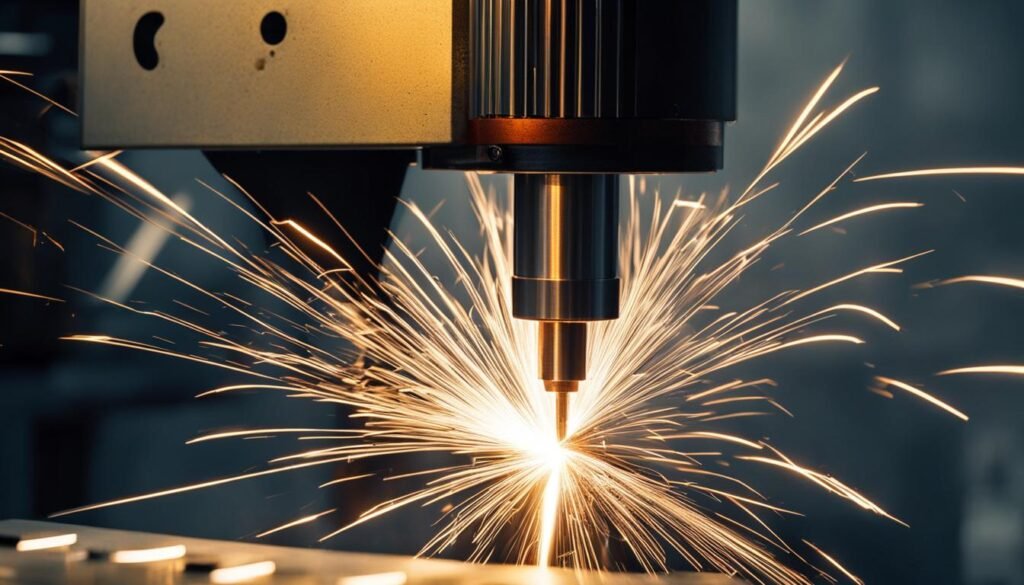
Advantages of CNC Electrical Discharge Machines (EDM)
- Superior precision and accuracy for intricate shapes
- Can work on hardened materials
- Produces high-quality finished products
- Wide range of applications in various industries
EDM offers unique capabilities and unmatched precision, making it a valuable asset for industries that require intricate and durable components.
| Advantages | Disadvantages |
|---|---|
| High precision | Higher initial investment |
| Can work on hardened materials | Slower cutting speed compared to other methods |
| Produces intricate shapes with tight tolerances | Not suitable for large-scale production |
CNC Router Machines
When it comes to shaping materials with precision and versatility, CNC router machines are the go-to choice. With their computer numerical control capabilities, these machines offer a wide range of applications for industries working with softer materials like wood, steel, composites, and plastics. Whether you’re a hobbyist or a professional, CNC router machines can help you bring your designs to life.
One of the key advantages of CNC router machines is their ability to be programmed to create intricate shapes and perform various operations. Whether you need to carve, engrave, or cut, these machines offer the flexibility to meet your specific needs. From crafting intricate designs on furniture to creating signage and prototypes, CNC router machines can handle a wide range of tasks.
These machines are widely used in industries such as woodworking, architectural modeling, and signage production. They offer a high level of precision and accuracy, ensuring that your projects are executed with perfection. CNC router machines also eliminate human error, delivering consistent and reliable results every time.
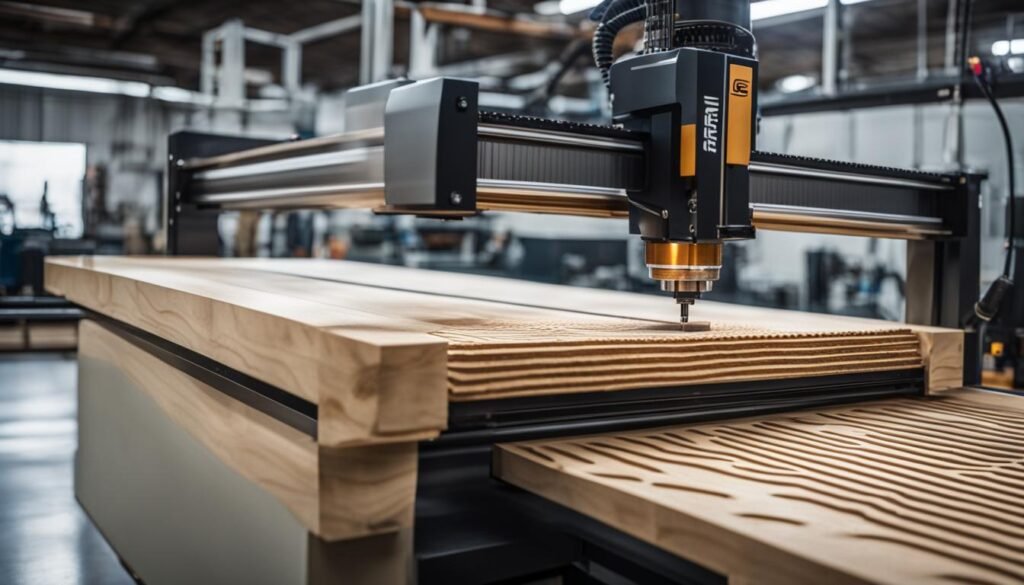
Advantages of CNC Router Machines:
- High precision and accuracy
- Versatility in shaping different materials
- Ability to create intricate designs
- Consistent and reliable results
- Efficient and time-saving
If you’re considering investing in a CNC machine, the choice between a CNC router and a CNC milling machine depends on your specific needs, budget, and desired level of precision. While CNC milling machines excel in working with harder materials and complex shapes, CNC router machines offer the flexibility to work with softer materials and create intricate designs. Evaluate your requirements and explore the capabilities of both options to make an informed decision.
Conclusion
In conclusion, this comprehensive guide has provided you with a thorough understanding of the various CNC mill types and their applications in different industries. By exploring the capabilities and advantages of each machine, you can now make informed decisions when selecting the right CNC mill for your specific needs.
When considering which CNC mill type to choose, factors such as the material of the workpiece, desired precision, and budget should be taken into account. Each machine offers unique features and benefits that cater to specific requirements.
Furthermore, the use of tool coatings can greatly enhance the performance and durability of CNC milling tools. Coatings such as carbide, ceramics, and diamond-like carbon (DLC) can improve cutting speed, reduce friction, and prolong tool life.
By applying the knowledge gained from this comprehensive guide, you are now equipped to explore the vast world of CNC mill types and refine your skills in CNC milling. Whether you are in the automotive, aerospace, or medical industry, understanding the applications and selection factors will help you make the most of these powerful machines.
FAQ
What is a CNC milling machine?
A CNC milling machine is a machine that uses cutting tools to remove material from a workpiece and shape it to specified specifications.
What are the different types of CNC milling machines?
There are various types of CNC milling machines, including 2-axis machines, 5-axis machines, and 6-axis machines.
What materials can CNC milling machines work with?
CNC milling machines can work with a wide range of materials, including hard metals, wood, plastic, and soft metals.
What are CNC routers used for?
CNC routers are more suitable for working with softer materials and are widely used for machining solid surfaces.
What are CNC lathe machines used for?
CNC lathe machines are used for shaping workpieces through operations like turning, drilling, and boring.
What are the advantages of CNC drilling machines?
CNC drilling machines offer the convenience of creating precise holes in different sizes and are faster than manual drilling approaches.
What can CNC grinding machines be used to create?
CNC grinding machines can be used to create cylindrical objects and other functional items, such as engine parts.
How do CNC plasma cutting machines work?
CNC plasma cutting machines cut through electrically conductive materials using high-powered plasma produced by a plasma torch.
What materials can CNC laser cutting machines cut?
CNC laser cutting machines can cut various materials, including plastic, paper, fabric, metals, and hardwood.
What are CNC waterjet cutting machines used for?
CNC waterjet cutting machines are used to cut materials like plastic and aluminum, especially heat-sensitive materials that could melt at high temperatures.
What are CNC electrical discharge machines used for?
CNC electrical discharge machines are used in the production of molds, dies, and metal components and tools.
What materials can CNC router machines shape?
CNC router machines can shape materials like wood, steel, composites, and plastic.
